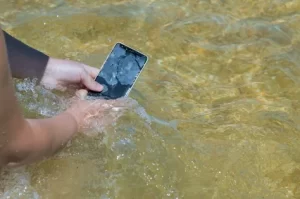
Love swimming, boating, and relaxing by the lake? You might be worried about your hearing aids getting wet. Accidents happen. In the heat of the moment, you might jump into a pool or the lake without removing your hearing aids first. You may also get unlucky and have them fall out into a stream of water, like a faucet, or a body of water. We have some dos and don’ts for you if your hearing aids ever get wet.
Do
If your hearing aids have gotten wet, it’s important to remember not to panic. We all know that water and electronics don’t mix, but that doesn’t mean you’re doomed. With some quick action, you can avoid major damage to your waterlogged hearing devices. For starters, get the hearing aids out of water immediately and remove the battery. A wet battery can be a problem down the road due to rust or corrosion. It’s better to just replace the batteries right away. You should keep a pack of spare batteries around at all times anyway—just in case. Once the battery is removed, dry the hearing aids as best as possible and then put them in a hearing aid dehumidifier if you have one. Otherwise, just leave them out to dry. How long you leave them out is dependent upon how wet they are. They may need a day or two of drying time. If you have rechargeable batteries that can’t be removed, put the devices into a bag of rice or dehumidifier to dry out. You could also bring them to Amdahl Hearing so we can dry them out in our dehumidifier.
After you’ve tried all of this, your hearing aids should work, but they may not. If they don’t work, you likely won’t have to purchase an entirely new set of hearing aids, as waterlogged hearing aids can typically be repaired. Repairs are far less costly and they’re oftentimes covered under a warranty.
Don’t
If your hearing aids get wet, don’t automatically assume that they’re beyond repair. Unless they were soaking in water for hours, it’s always best to try out the steps above to see if you hearing aids still work rather than just throwing them away and investing in a new pair. It also probably goes without saying that you should keep your hearing aids away from any sort of device that could melt the circuitry, like a microwave, oven, or blow dryer. This is not the way to dry out your hearing aids.
Hearing aids come with an IP rating, which measures how well the hearing devices are protected from moisture/liquids. That means that your hearing aids are water resistant up to a certain level. If you are worried that you are at risk of getting your hearing aids wet, invest in a pair of hearing aids with a high IP rating.